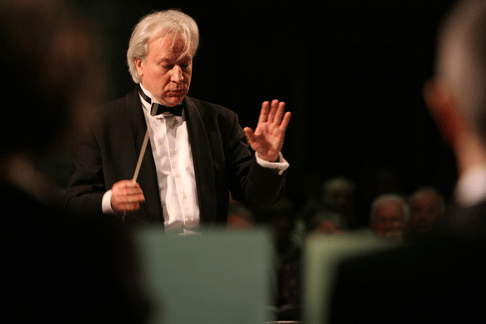The Norma was Yvonne Howard, a career mezzo whose recent forays into the soprano repertoire (notably, Leonore for Opera Holland Park and Lady Macbeth for Opera North) have been proving consistently successful. She undoubtedly sounds more soprano than mezzo these days, her voice brighter-hued than that of the Adalgisa, Alwyn Mellor, and her top notes easily produced and fully integrated with the rest of her voice. Though both women acquitted themselves admirably, it’s always difficult to ensure an adequate contrast between the two voices, and with this cast it didn’t come off; Mellor is a soprano, but a dark-toned, weighty one, and without knowing the plot it would have been impossible to tell which of the two women was meant to be the younger.
Under the baton of Michael Rosewell, Bellini’s score sounded classy, the four-square rhythms of the choruses crisp and poised, and the legato of the female-voice numbers elegant. The acoustic of Cadogan Hall has the benefit of making small forces sound full-bodied and substantial; I need not have worried about the volume limitations of an 18-strong chorus and an orchestra of fewer than 40. At the same time, solo voices can also carry well here, with Howard’s beautifully contained pianissimo in ‘Casta diva’ set off by the subtle orchestral texture. And the hall gives an immediacy to the opera’s more intimate dialogues, especially those between the two women; the soft opening section of ‘Mira, o Norma’ felt as though the audience were intruding upon a very private moment. One wonders whether the conversational style of the duets came across quite so powerfully at the tour’s larger venues, which included Exeter Cathedral.
Elsewhere the balance was more problematic, with the chorus tenors drowning out the women’s voices, and an excess of bassy orchestral sound threatening to overwhelm the tenor Justin Lavender in Pollione’s opening aria. Lavender was somewhat wooden and he failed to give the vocal line much shape; Piotr Lempa’s Oroveso was vocally adequate but rather stiff and characterless.
Considering the musical intimacy between the female voices, it was a shame that the opera was given in such strict ‘concert’ fashion. Though entrances and exits were made as necessary in a cursory step towards being semi-staged, the duetting singers always facing straight ahead and barely exchanging glances with one another.
 Michael Rosewell [Photo courtesy of English Touring Opera]
Michael Rosewell [Photo courtesy of English Touring Opera]
The roles of Flavio and Clotilde were satisfactorily taken by Charne Rochford and Helen Johnson, who doubled as members of the chorus.
Onto the autumn, and ETO’s next project - in celebration both of its own anniversary and of Handel’s — will be the staging of five different Handel operas, in a tour which commences in October at the Britten Theatre at the Royal College of Music.
Ruth Elleson © 2009

